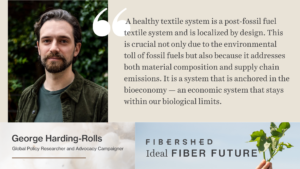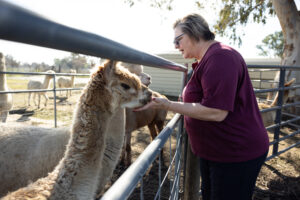
June 2022 marks the third year in a row of people all over the world coming together to explore the power of localization, and to honor the many efforts and initiatives – old and new – that foster ecological economies, thriving communities, and healthy local food systems.
World Localization Day on June 21st celebrates the worldwide localization movement – not only on the day itself, but during the entire month of June.
Localization Information, Stories, and Resources

- Degrowth: An Economic Framework that Values Ecosystem Capacity, Human Dignity, and Self Sufficiency | This article uses the fashion industry’s linear supply chain to explain how a growth model exploits people and the planet and offers a vision for a circular and regenerative model that promotes thriving local economies.
- 3 Maps Show How We Can Unlock Local Clothing Industries | Learn how Fibershed’s RFMI Ecosystem Mapping is setting the stage for designing and implementing key expansions in textile manufacturing in the Western United States.
- Benefitting Climate & Communities: How Clothing Cooperatives Could Grow Equitable Regional Economies | Cooperative structures like the Carolina Textile District provide an inspirational example of the type of regional networks that could grow and flourish throughout the country.
- A Story of a Working Sweater: In Collaboration with Sheep, Shepherds, and Artists | Five Fibershed producer members offer their perspectives on the creation of a community-constructed sweater using Santa Cruz Island sheep wool.
- Creating a Carbon-based Local Economy | How can local economies value carbon farming practices in finished consumer goods? Learn more from Fibershed Executive Director Rebecca Burgess.
- Local, Slow, and Sustainable Fashion |Draws on an inclusive range of authors to deliver a representative examination of the textile industry and explores the importance of local practices in achieving global sustainability.
- Supply Chain Failures Prove Growing Need for Localized Economies | “During the pandemic, most countries would have been far better off had they relied more on local production, rather than on specialized production for global trade.”
- What If We Owned It? | Leaders in the Black food co-op movement understand that healing in communities is not only about economic opportunities and access to nutritious food, but also about providing a sense of safety and dignity to the shopper and worker.
- Native American Tribes Are Rebuilding Their Local Economies for a Better Quality of Life. | From event venues to wineries to clean energy plants, Native local businesses are blossoming.

- Fibershed 2021 Symposium: Presentation by Anja Lynbaeck of Local Futures | Anja Lynbaeck of Local Futures, an organization that develops, advocates, and connects communities growing ecological economies from the ground up, discusses the importance of prioritizing local economies.
- A Natural Systems Approach to Local Economic Development | This talk presents a clear case that runs counter to prevailing economic theory – that in order to reverse course on our most intractable problems, we must accept limits to growth and humble ourselves to become students of natural systems.
- Building Local Economy and Healing the Climate | Fibershed’s local economy network is based on carbon farming practices that capture atmospheric carbon and store it in the soil. Soil carbon supports a regenerative fertility cycle and is the building block for a climate-friendly life-promoting economy.
- How to Build a Place-Based Economy Where You Live | How can communities rethink ownership to remedy poverty? Eric Kornacki shares the story of his journey carrying lessons learned from Central American sweatshops to empower the transformation of a now-gentrifying neighborhood gripped in poverty in his hometown of Denver.

- What would it take to make our clothing regionally?| Take a look at manufacturing systems and learn about some of the missing links and key opportunities that would help make locally grown clothing more accessible in the Western United States.
- Building relational, regenerative systems with localized Fibersheds | Rebecca Burgess sheds light on why the real solutions we need for our ecological crises will likely be undervalued and given less attention to (when compared to solutions driven by synthetic biology corporations); how localizing our textile systems can green the fashion industry in ways that a globalized system cannot; and more.
- Black Material Geographies – Imaging Regional Fiber Initiatives |Teju Adisa-Farrar illuminates essential stories and histories of Black material and textile cultures, exploring how we can create more sustainable systems and processes amid global climate crises and lifestyles deeply entrenched in global capitalism.
- Creating the Framework for a New Economy | Jay Tompt tells the story of the REconomy Centre. A little bit startup incubator, a little bit co-working space, and a little bit gift-economy networking hub, this “new economy wing of the Transition movement” emerged from an abandoned office building in Totnes, England to bridge political divides and help create the conditions needed for holistic local economies to emerge around the world.

- Sign up for the Local Futures email list to get updates on WLD events throughout the month of June.
- Host a localization event in your area: From film screenings to local food feasts, your local event can be part of this initiative!
- Find a fibershed in your area: The Fibershed Affiliate Program supports an international grassroots network that promotes the development of regional fiber systems communities, including economic and non-economic growth, in the form of building relationships and new global networks.
- Stay in the loop with Fibershed: If you’re interested in local economies, consider signing up for the Fibershed newsletter to learn all about how local fiber systems can benefit communities and ecosystems.





